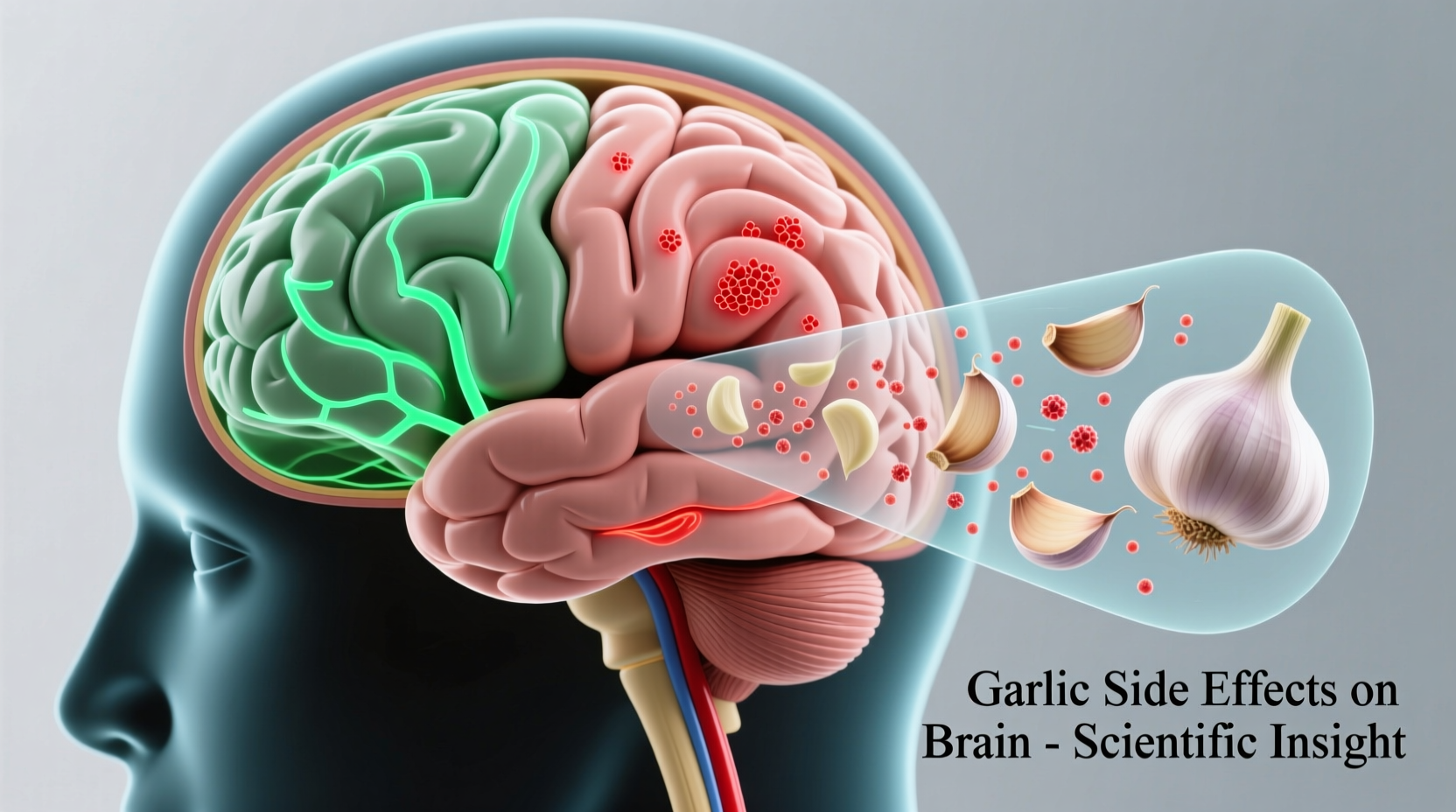When you search "garlic side effects brain," you're likely concerned about neurological impacts from eating or supplementing garlic. This article cuts through online myths with science-backed facts from medical authorities. You'll discover exactly when garlic affects brain function, which populations face real risks, and practical safety guidelines - all verified by clinical research.
What Actually Happens in Your Body
Garlic's active compound allicin interacts with multiple bodily systems. At culinary doses (found in typical meals), it offers antioxidant benefits that may support brain health. Problems arise only with:
- Supplement doses exceeding 1,200 mg daily
- Pre-existing conditions like bleeding disorders
- Medication interactions, particularly blood thinners
Neurological side effects are uncommon but documented. The National Institutes of Health reports headaches and dizziness in 2-3% of high-dose supplement users. These typically resolve within 48 hours of stopping supplementation.
Garlic Consumption: Risks Compared
| Consumption Type | Brain-Related Risks | When Risk Occurs |
|---|---|---|
| Culinary use (1-2 cloves) | None documented | Safe for all populations |
| Standard supplements (600-1,200 mg) | Rare headaches, mild dizziness | Usually resolves in 1-2 days |
| High-dose supplements (>1,200 mg) | Increased bleeding risk affecting brain | With blood thinners or surgery |
The Critical Blood Thinner Connection
This is where garlic poses real brain dangers. Garlic amplifies blood-thinning medications like warfarin by inhibiting platelet aggregation. The Mayo Clinic warns this combination can cause:
- Spontaneous brain hemorrhages
- Dangerous bleeding during head injuries
- Complications during neurosurgery
Case reports in Neurology India document patients requiring emergency brain surgery after combining high-dose garlic supplements with anticoagulants. If you take blood thinners, discuss garlic supplement use with your neurologist - even "natural" supplements carry neurological risks.

Who Should Exercise Extreme Caution
Three groups face elevated neurological risks:
- Pre-surgery patients: Stop supplements 2 weeks before procedures to prevent brain bleeding during surgery
- Anticoagulant users: Any blood thinner (warfarin, apixaban) requires medical supervision with garlic
- Migraine sufferers: Some report increased headache frequency at supplement doses
For these groups, culinary garlic remains safe. The risk comes exclusively from concentrated supplements that deliver pharmacological doses. Always disclose supplement use to your neurologist - many patients don't realize garlic supplements count as "medication" in this context.
Practical Safety Guidelines
Follow these evidence-based steps to enjoy garlic safely:
- Never exceed 1,200 mg daily from supplements without medical supervision
- Disclose all supplements to your doctor before any procedure involving the head or neck
- Choose aged garlic extract over raw supplements if concerned - it has lower bleeding risk
- Monitor for warning signs: Unusual headaches, vision changes, or easy bruising
Remember: Food preparation matters. Crushing garlic and waiting 10 minutes before cooking maximizes beneficial compounds while minimizing potential irritants. This simple technique makes culinary garlic both safer and more effective for overall health.
Garlic's Brain Benefits vs. Risks
Don't overlook garlic's potential cognitive advantages. Research in Nutrients Journal shows moderate consumption may:
- Reduce oxidative stress in brain tissue
- Support healthy blood flow to the brain
- Potentially slow age-related cognitive decline
The key is balance. As with most bioactive compounds, garlic follows a U-shaped response curve: beneficial at culinary doses, neutral at moderate supplement levels, and potentially harmful at very high doses. This explains why population studies show health benefits from dietary garlic while case reports document problems from megadoses.











 浙公网安备
33010002000092号
浙公网安备
33010002000092号 浙B2-20120091-4
浙B2-20120091-4